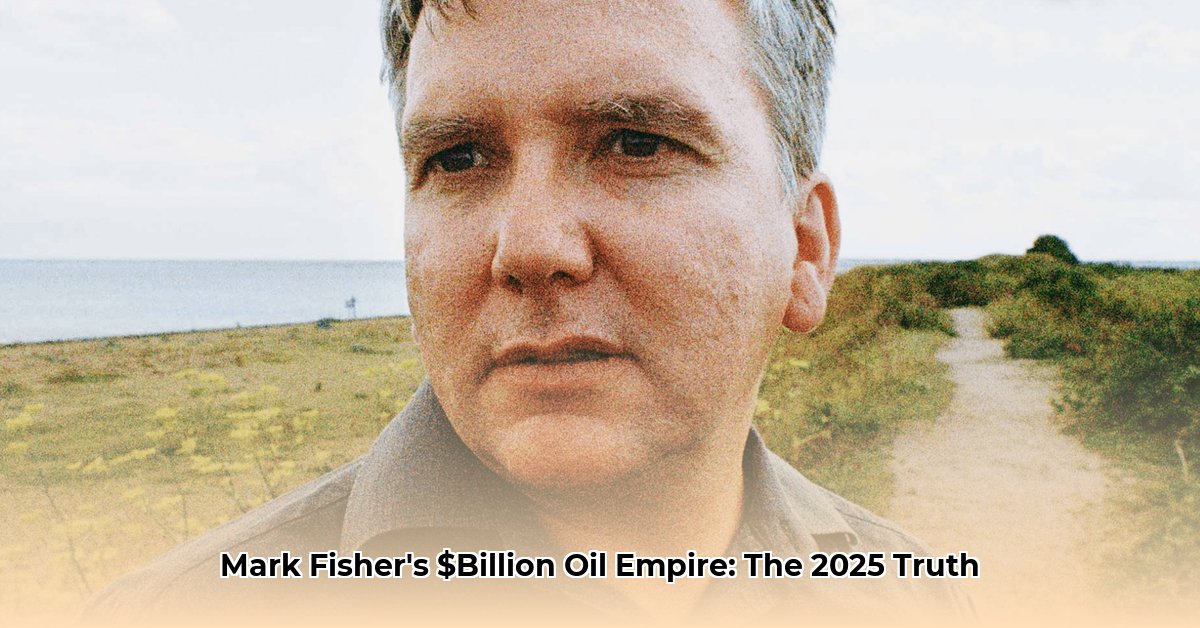
Mark Fisher: A Career Built on Oil and Enigma
Mark Fisher's name resonates in the hushed tones of high finance, a figure whose immense wealth remains as elusive as it is impressive. While his success in oil trading is undeniable, the precise extent of his fortune is shrouded in secrecy, leaving us to piece together a fragmented narrative. This article attempts to untangle the complexities of Mark Fisher's career and wealth, acknowledging the significant limitations in definitively assessing his net worth. For more details, see this detailed profile.
The Billionaire's Puzzle: Estimating Mr. Fisher's Net Worth
Estimates place Mark Fisher's net worth at approximately $500 million (as of 2025). However, this figure is less a definitive statement and more an educated guess, based on available (and limited) information. The ultra-wealthy often employ sophisticated financial structures designed to obfuscate their assets, making precise estimations incredibly challenging—a challenge further compounded by the inherent lack of public transparency. This opacity is not unique to Mr. Fisher; it's a systemic issue when analyzing the finances of high-net-worth individuals (HNWIs). How can we possibly verify such estimates? The answer is multifaceted and often frustrating.
Deciphering the Clues: An Evidence Spectrum
Attempting to assess Mr. Fisher’s wealth requires navigating a complex spectrum of evidence. Some pieces of the puzzle are clearer than others:
| Type of Evidence | Reliability | Usefulness |
|---|---|---|
| Evidence of Success in Oil Trading | High | Strong indicator of significant wealth accumulation |
| Public Net Worth Estimates | Low | Highly speculative, lacks verifiable supporting data |
| Information on Investment Strategies | Low | Largely based on speculation; limited reliable details |
The high reliability of evidence concerning his oil trading success contrasts sharply with the low reliability of public net worth estimates. These estimates, while commonly cited, often lack the supporting documentation needed for verification. Even information on investment strategies remains highly speculative due to the private nature of such dealings. This inherent lack of verifiable data means any conclusion concerning his exact net worth remains provisional.
From Oil Trading to Diversification: Tracing Mr. Fisher's Career
Mark Fisher's journey to immense wealth began in the volatile world of oil trading. His early career demonstrates a sharp acumen for market analysis and calculated risk-taking. This foundation of success in the energy sector laid the groundwork for subsequent diversification into other sectors, likely including real estate, technology, and healthcare—though the specifics remain largely unknown. This diversification suggests a sophisticated understanding of risk management, a common characteristic among successful investors. But without access to his private portfolio, the exact composition of his assets and his strategic investment approaches remain fundamentally speculative.
The Regulatory Landscape and the Limits of Transparency
The challenges faced in estimating Mark Fisher's net worth highlight a broader systemic issue: the lack of transparency surrounding the financial affairs of HNWIs. Current regulations, while designed to prevent financial crimes, may not be fully equipped to address the complex financial structures used by the ultra-wealthy to maintain privacy. This opacity raises concerns about potential tax evasion and money laundering, underscoring the need for ongoing review and potential reform of financial regulations governing the disclosure of high-net-worth individuals' assets.
Conclusion: The Need for Greater Transparency in High Finance
The case of Mark Fisher underscores the complexities involved in accurately assessing the wealth of HNWIs. The inherent limitations of available data and the opacity created by complex financial arrangements emphasize the need for a more transparent financial system. Greater transparency is not merely about satisfying public curiosity; it's paramount for ensuring fair taxation, maintaining regulatory compliance, and fostering a level playing field in the global economy. The ongoing debate surrounding financial transparency and the call for strengthened regulatory oversight will continue to be crucial in addressing these issues and shaping the future of high finance.